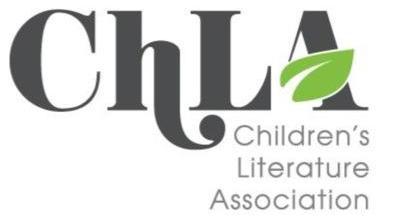- About ChLA
- Committees
- Accessibility Committee
- Anne Devereaux Jordan Committee
- Article Award Committee
- Astrid Lindgren Award Committee
- Book Award Committee
- Communications Committee
- Conference Advisory Committee
- Diversity Committee
- Edited Book Award Committee
- Ethics Committee
- Finance and Development Committee
- Grants Committee
- Global Committee
- Judith Plotz Emerging Scholar Award Committee
- Membership Committee
- Ombuds Committee
- Phoenix Award Committee
- Phoenix Picture Book Award Committee
- Members
- Events
- Awards & Grants
- Publications
- Opportunities & Resources
ChLA Core ValuesMission:Encouraging high standards of criticism, scholarship, research, and teaching in children’s literature. Values:Inclusivity: We support scholarship and pedagogy on the range of literary and cultural productions for young people, including work in young adult literature, children’s literature, cultural studies, digital media, adaptation, as well as youth-produced texts. Diversity: We embrace our responsibility to the diversity of childhoods by supporting scholarship on work by Indigenous, Black, and people of color creators, and scholarship that engages disability studies, religious and class diversity, and gender and sexual identities. We support scholars who are located within these communities. Integrity: We support equity, social justice, and accessible space and opportunity, and we work to build a community that offers a transparent, equitable, forward-thinking implementation of our mission. We support the academic freedom of international children’s literature scholars to pursue their work without interference. Development: We value new ways of thinking and innovative approaches to the field; we welcome members of all ranks and positions, support emerging scholars entering critical conversations, and seek to advance the success of all scholars in our field. Celebration: We recognize the lasting value of works for children by awarding the Phoenix Award and Phoenix Picture Book Award; we honor those authors and illustrators whose work has impacted the field of study. We recognize significant contributions in scholarship and/or service to the field of children's literature and hold mentors in high esteem. Communications Best Practices: Every committee, both standing and ad hoc, should meet individually each year to discuss and establish expectations around communication and completion of committee work in order to ensure that all committee members have equal opportunity to participate fully. After carefully reviewing ChLA’s core values, the committee should hold an initial meeting to agree upon a preferred mode of communication, taking into account individual needs and equitable access. The responsibility for clear, consistent, and effective communication across the year rests with the committee chair, who sets deadlines and procedures in consultation with the group. Communication and work practices should be reasonable and responsive, and the goals of the committee clear and specific. Communication should be grounded in respect for each other’s knowledge, fields, experiences, and personal identities. The committee’s agreed upon communications practices should be revisited when there is a change in the committee’s membership or communication needs. All members of our community will treat each other with respect and as professionals in all interactions; however, if a solution cannot be found, members of the committee can consult with the Accessibility Committee for assistance. If there is a need for mediation, committee members should contact ChLA’s Ombuds Committee for support and assistance. Posted: 8.21.20 |
